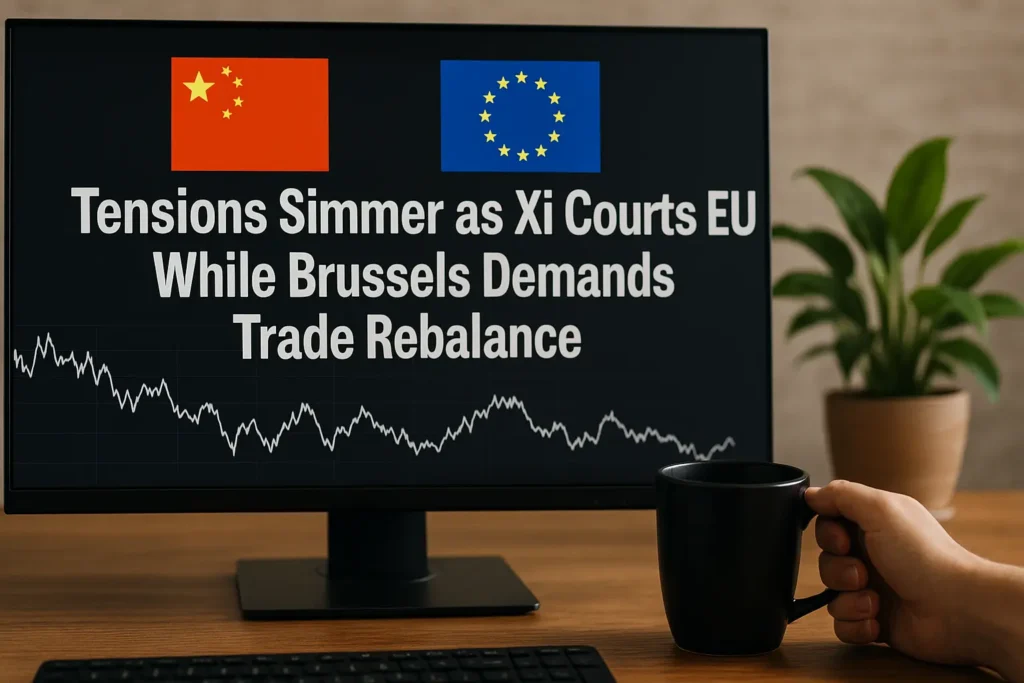Tensions rise as Xi Jinping tries to win over the EU amid growing calls from Brussels to rebalance trade. Explore how this standoff impacts global markets, EV competition, and U.S. economic interests.
🇨🇳🇪🇺 A Diplomatic Chess Match Unfolds
In a world where trade routes are the new battlefields and economic alliances redefine global power, a high-stakes game is playing out between China and the European Union (EU). Chinese President Xi Jinping is ramping up diplomatic efforts to win over European leaders, even as Brussels grows increasingly vocal about the need to rebalance trade with Beijing.
This latest development comes at a time of growing skepticism in Europe about China’s trade practices, especially in sectors like electric vehicles (EVs), solar panels, and telecommunications.
🔍 What’s Driving the Trade Tensions?
The EU has long been one of China’s largest trading partners, but the relationship has grown complicated. In 2023 and 2024, Europe’s trade deficit with China ballooned, prompting widespread concern about unfair market access and state subsidies that tilt the playing field in China’s favor.
According to Eurostat, the EU’s trade deficit with China was over €400 billion in 2024 — a record high. The imbalance is particularly stark in green tech sectors, where China dominates global exports.
🇨🇳 Xi’s Strategic Outreach to Europe
In response, President Xi has launched a campaign of charm diplomacy. His administration has:
- Sent multiple high-level envoys to Germany, France, and Brussels.
- Promised greater market access for European firms in finance and agriculture.
- Signaled support for climate cooperation and cross-border investment.
This is part of China’s larger plan to weaken the transatlantic alliance between the EU and the United States, especially as Western countries tighten restrictions on Chinese technology exports.
🛑 EU Pushes Back: “We Need a Level Playing Field”
While Xi may be extending a hand, Brussels is not shaking it without conditions. European Commission President Ursula von der Leyen has made it clear that the EU demands:
- An end to industrial overcapacity from Chinese exports flooding the market.
- Transparency in state subsidies for Chinese companies.
- Reciprocal access to Chinese markets for EU companies.
One of the most hotly debated issues is China’s EV exports. European automakers like Volkswagen and Renault face mounting pressure from heavily subsidized Chinese competitors like BYD, Nio, and Xpeng.
“We welcome cooperation, but not at the cost of our industries and jobs,” von der Leyen said during a recent press conference.
🔋 Green Tech as the Flashpoint
The race for clean energy dominance is at the core of the trade rift. China is the world leader in:
- Battery production
- Solar panels
- Electric vehicles
Europe, aiming for climate neutrality by 2050, is deeply reliant on Chinese imports in these areas. But that dependence is now seen as a strategic vulnerability.
In response, Brussels is:
- Proposing tariffs or countervailing duties on certain Chinese green imports.
- Funding the development of EU-based gigafactories.
- Increasing scrutiny on Chinese M&A deals in European energy firms.
🤝 Is Decoupling Even Possible?
Some American analysts suggest Europe is headed toward a “de-risking” strategy, similar to the U.S., rather than full economic decoupling from China. Europe doesn’t want to be overly reliant on Chinese supply chains, but also can’t afford to completely sever ties — at least not yet.
“Xi is trying to play divide-and-conquer with the EU and U.S., but Brussels is more unified now than it was five years ago,” said Dr. Sarah Klein, a political economist at Georgetown University.

🧭 Implications for American Readers and Investors
If you’re wondering why this matters for Americans — it’s all connected.
- Supply Chains: U.S. and EU supply chains are interwoven. Tensions with China can disrupt imports and pricing.
- EV Market: As the EU moves to restrict Chinese EVs, U.S. manufacturers may find new opportunities to expand into Europe.
- Global Stocks: Rising trade friction could impact stocks of multinational firms like Tesla, Apple, and Volkswagen.
- Geopolitics: A divided Europe would weaken Western efforts to counterbalance China’s growing influence in global institutions like the WTO and IMF.
📉 What Could Go Wrong?
While Xi’s charm offensive might yield temporary goodwill, deep structural issues remain unresolved. Trade tensions could:
- Erupt into a tariff war similar to the U.S.-China standoff.
- Trigger retaliatory measures from Beijing.
- Lead to investment slowdowns between the two blocs.
The worst-case scenario? A full-blown trade cold war between the EU and China, forcing global companies to choose sides.
🔮 What’s Next?
Expect more rounds of negotiations, trade probes, and policy adjustments in the coming months. The EU may announce formal countermeasures by late 2025 if no tangible trade reforms are seen from China.
For now, Xi’s diplomatic efforts are being watched closely. But goodwill won’t be enough — Europe wants results.
💼 Final Takeaway
The relationship between China and the European Union is entering a delicate, high-stakes phase. President Xi’s outreach may seem like a step toward cooperation, but Brussels is demanding real economic balance.
For American readers, investors, and policymakers, this unfolding narrative is more than distant diplomacy — it’s a signal of shifting power structures that may impact global trade, tech innovation, and financial markets.

Aslo check it
OpenAI CEO Sam Altman Warns of Impending AI ‘Fraud Crisis’ Amid Voice Cloning Threats
